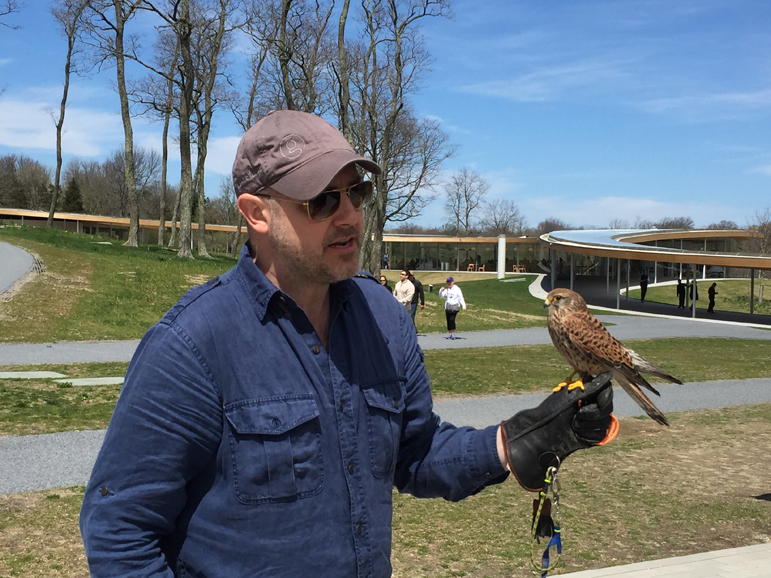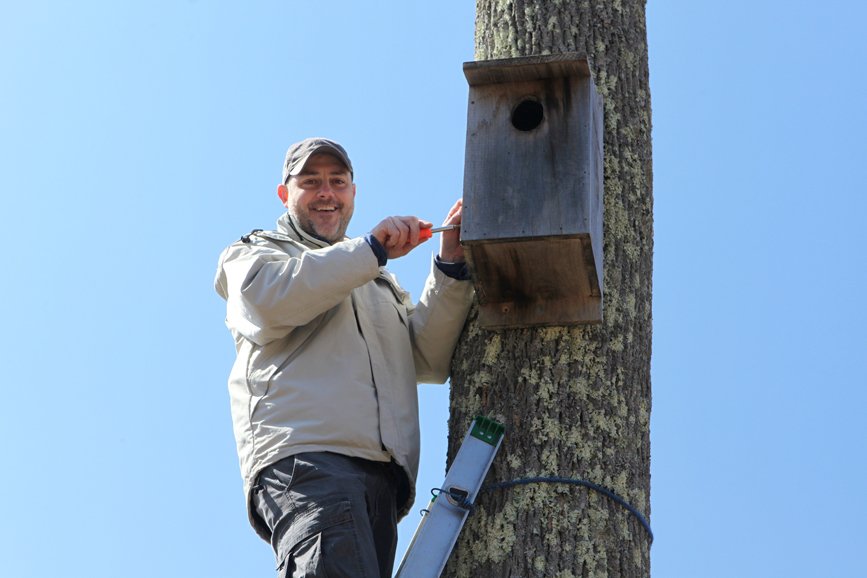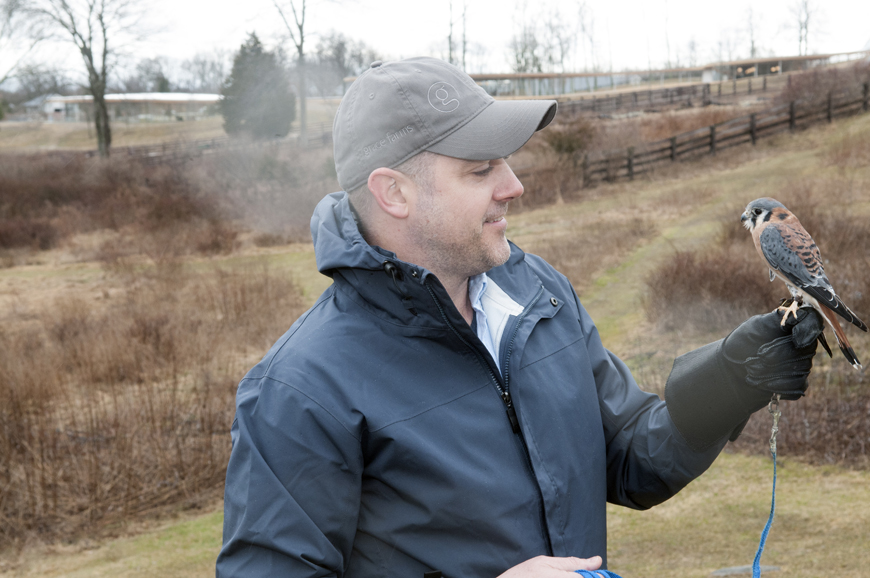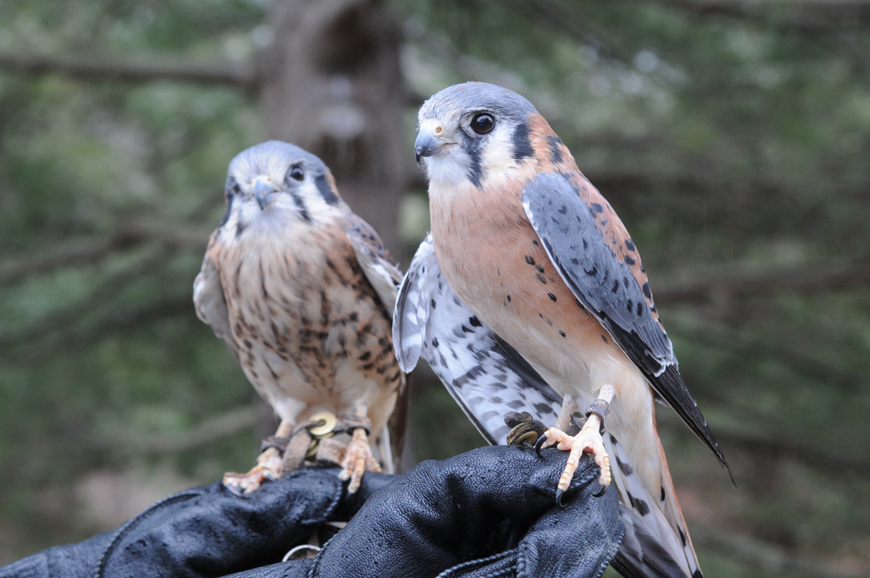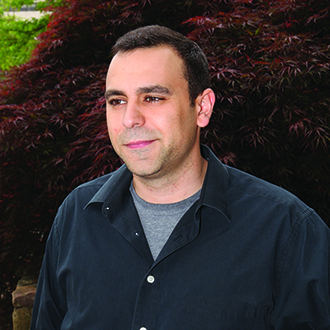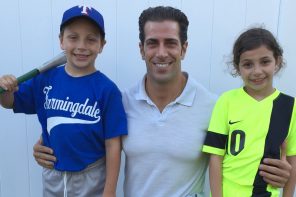Don’t judge yourself too harshly if you’ve never heard of the American kestrel falcon. The smallest raptor in North America, the kestrel has been a rare sight in Westchester and Fairfield counties due in large part to the loss of habitat amid dense populations.
But at Grace Farms — an 80-acre sanctuary in New Canaan dedicated to the promotion of nature, art, community, justice and faith — the birds are once again calling Connecticut home thanks to the efforts of Mark Fowler, the property’s recently appointed nature and wildlife ambassador and the son of wildlife expert and onetime “Mutual of Omaha’s Wild Kingdom” host Jim Fowler.
“I was lucky enough to travel the world, to experience being chased by elephants, being chased by a grizzly bear — amazing experiences very few people get to have,” Mark Fowler says. “I feel like it’s my job to be a spokesperson and share that excitement with the public and get them as excited about nature as I am.”
A native of New Canaan, Fowler was 8 when he rescued his first bird of prey, an injured baby red-tailed hawk whose mother had died from exposure to insecticides.
“That just pretty much changed my life with birds of prey,” he says.
Fowler nursed the hawk to health and released it, igniting a lifelong passion for raptors and the natural world. Before coming to Grace Farms, Fowler built a career producing wildlife films for the National Geographic, Discovery and Travel channels and Sony Pictures Television as well as nonprofits and government agencies that include NASA and the Smithsonian National Air and Space Museum.
Since joining Grace Farms this past winter, he has had great success in his mission to reintroduce kestrels due in part to the property’s array of resurging ecosystems.
Within eight days of putting up a specially designed kestrel nesting box, the species returned to the area to the complete surprise of longtime kestrel monitoring organizations, which had not heard of a kestrel sighting in the area in three decades, Fowler says.
“Wildlife is thriving in the Northeast where two generations before it was almost all hunted out,” he says. “For the generation before me, there weren’t even deer here. My father-in-law said he saw deer once in his entire life growing up in New Canaan. Now we see hundreds.”
Paddocks still stand on the property as a legacy of its history as a former horse farm, a reminder the Grace Farms Foundation has committed to retaining while also allowing the land to return to the forests, fields and marshes..
“Back in 1850s, you could see the Sound from right here because all the trees were gone,” Fowler said standing on the property’s crest.
Meadows are particularly important to kestrels, which need the space to dive at up to 40 mph to catch prey such as the insects, rodents and snakes common to field habitats.
As important to the species are the tree hollows found in old, mature forests, the kind uncommon to densely populated regions with relatively young trees.
The kestrel is one of 40 different species of birds in addition to 16 types of amphibians and reptiles that are found within the sanctuary’s 10 ecosystems.
This falcon is also one facet of a larger effort to reconnect children and adults with a magical thinking lost in the modern, increasingly virtual world.
“We all grew up running around in the woods,” Fowler says. “The unplanned play of what we did — getting muddy in creeks, digging holes, building forts — as a kid it’s the first time you really feel that feeling, that awe and that wonder you experience in nature.”
But for the generations born into the screen-dominated digital era, this perspective may be wholly lost.
“We as humans have never been more disconnected from the natural world,” he says. “Kids are spending between five and 30 minutes outside a day.”
Grace Farms and Fowler are succeeding in drawing people to the sanctuary and closer to the natural world. The property’s centerpiece, an 83,000-square-foot flow of glass and wood known as the River Building, attracts a steady flow of visitors with its public library, amphitheater and café, among other facilities surrounded by walking trails.
For Earth Day festivities earlier this year, more than 1,600 people visited Grace Farms for events and programs that included interactive displays of birds of prey, such as the peregrine falcon — the fastest animal on earth, reaching speeds of over 200 mph in a dive — a relative of the great horned owl and a red-tailed hawk, which now lives on the property.
“We are lucky enough in Connecticut to be surrounded by wildlife, but we often take it for granted and don’t even realize what’s around us,” Fowler says. “Right now on the Grace Farms property and throughout the county we have black bears, coyotes, bobcats, numerous types of birds of prey, tons of hawks, falcons… It just goes to show we can bring back wildlife and coexist with it.”
Grace Farms is open to visitors every day except Mondays. For more, visit gracefarms.org.

